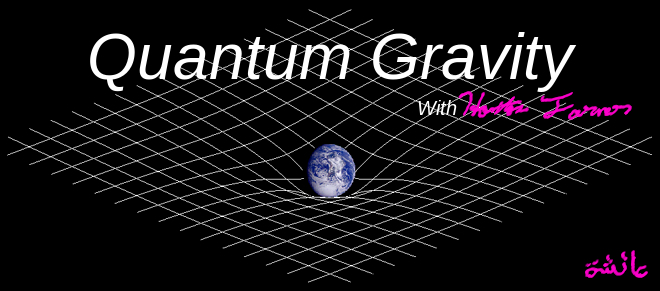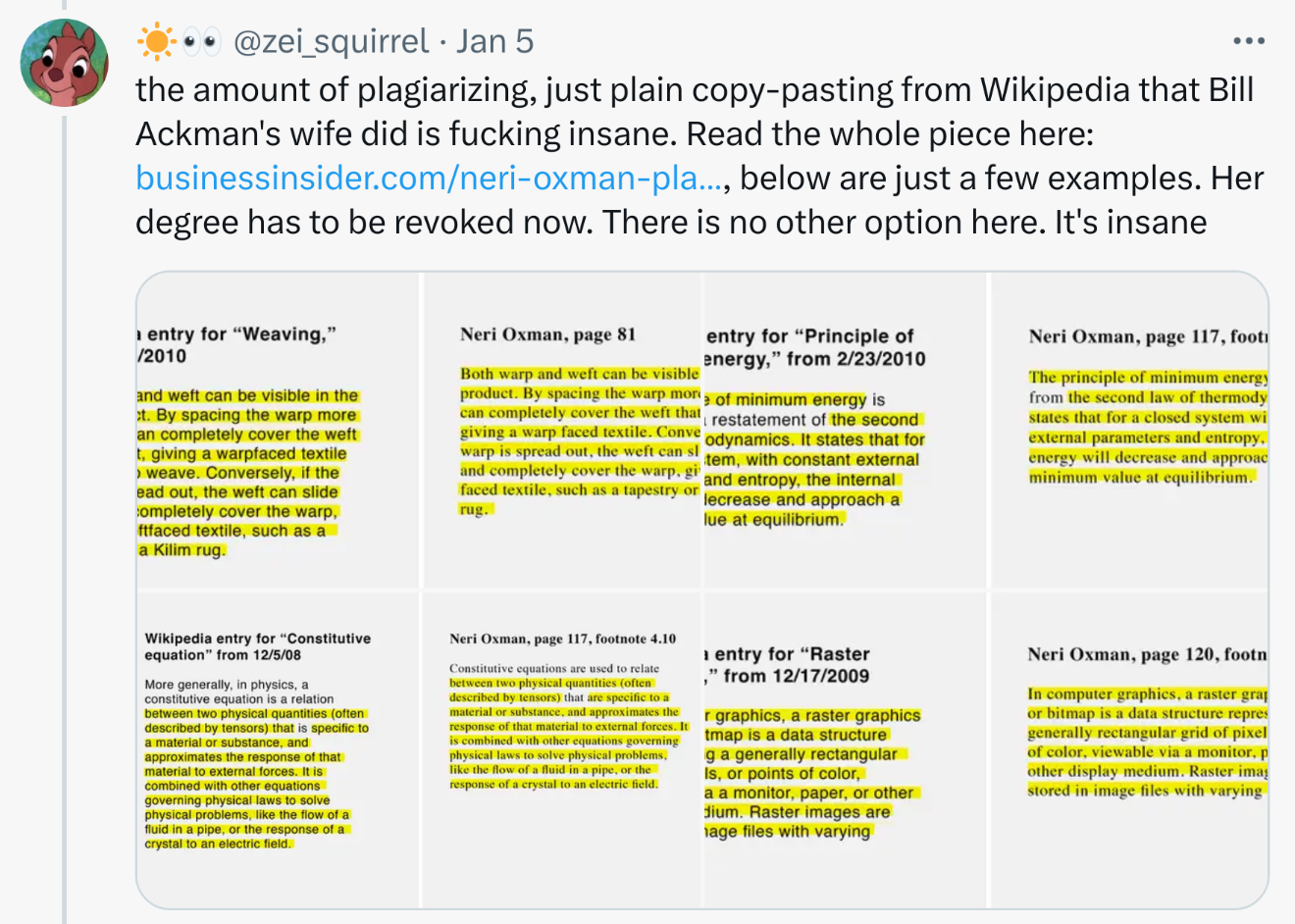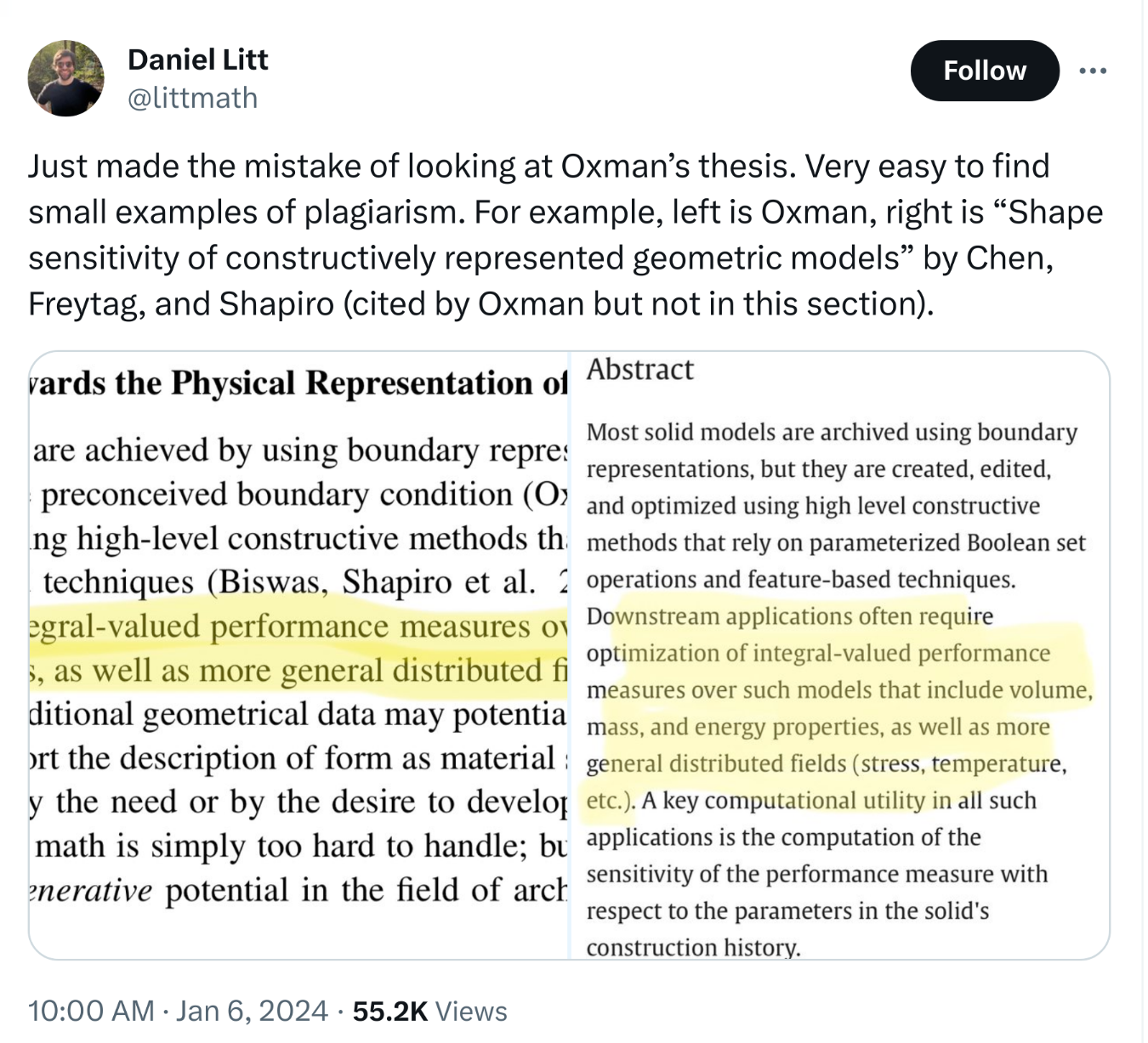The online discourse of our time has come to the issue of plagiarism. Now Claudine Gay and Neri Oxman of Harvard and MIT have been accused of plagiarism for what are basically political reasons. Gay was president of Harvard and did not condemn students who protest against Israels actions in Gaza in ways that may cross a line into anti-semitism. A man named Bill Ackman a billionaire donor to Harvard is the husband of Neri Oxman so others have gone after her. In both of these cases what is being called Plagiarism is not plagiarism. Both of them are innocent of that and are at worst guilty of sloppy citation.
According to Websters Dictionary.
plagiarized; plagiarizing
Synonyms of plagiarize
transitive verb
: to steal and pass off (the ideas or words of another) as one's own : use (another's production) without crediting the source
intransitive verb
: to commit literary theft : present as new and original an idea or product derived from an existing source
Websters gives us two important things that can be plagiarism ideas and words. Sloppy citation of which both Oxman and Gay are guilty is inadvertently passing off words. In both cases however these were words which are in the literature review of their papers or which are nothing more than statements of laws of nature. Furthermore they cited these sources elsewhere in the paper just not right by a given bit of boilerplate text typically common to papers in their fields beacuse it describes things which have just one way they can be correctly described.
Let me make this perfectly clear. It is not necessary to cite common knowledge. It is not necessary to cite a dictionary, thesaurus, encyclopedia, textbook or any other uncontroversial source of common knowledge.
One does not need to cite Eratosthenes when stating that the Earth is round.
Failure to cite a paper written for discipline specialist when discussing the basic methods and materials used by everyone in that field is not plagiarism. Who cites Microsoft or Linux Torvalds or whoever authored the operating system you use on your computer to write a paper? Who cites the font artist who created the font that it is written in? It sounds absurd, it sounds like a nonsequitr to even suggest such a comparison. Yet without those things no one could do any of this work we are discussing.
So let us regain some sanity regarding what is and is not plagiarism.
A guide to what is not plagiarism:
The following applies broadly to STEM. In Scientific fields one is discussing real world phenomena, physical things that have defined characteristics. This means that there is not infinite room to creatively reword or redescribe most of what one is writing about. Fiction is completely different and gives much more latitude.
There is only one way to write “energy is equal to mass times the speed of light squared”, as a sentence. In 1925 or 1930 there was no need to cite “On the Electrodynamics of Moving bodies”. Everyone used its findings but no one ever ever said that it has to be cited all those times. There is only one way to write “Force is equal to mass times acceleration” and no one cites Philosophiæ Naturalis Principia Mathematica for it.
For sciences here are the rules:
Do not cite basic reference materials. One can freely quote dictionary definitions, thesaurus synonyms, encyclopedia articles, blocks of open source code, and commonly known laws and theories of physics, chemistry, and other natural sciences. The same goes for the textbook for a course one is currently taking. There is no need to cite that. In terms of how much you can quote from such sources it depends on how much of your writing will be your original work. If you quote half a page but are writing 100 pages in total then it's fine.
Do not cite common knowledge that is a century old. As a rule any information that comes from a well known, uncontroversial work that is 50 + years old need not be cited. Example it might be nice to cite “On the Electrodynamics of Movie Bodies” by A Einstein, but no one does.
Citation of well known papers that are over 25+ years old is optional. Likewise stating the findings of well known more recent papers but not formally citing them is not plagiarism. Especially in papers written for specialist in the field who all know the literature. This is true even if your paraphrase is close since in many technical fields there is really just one way to say a given finding.
Citation of mathematical equations is optional. However, if you do not cite them then demonstrate the derivation from first principles in your own paper. For example one could demonstrate that Einstein’s famous equation can be derived from a consideration of energy-momentum space, and the Pythagorean theorem. If one can do this, even if one was doing it in 1910 one could get away with not citing Einstein. This would be because your derivation would be independent.
The descriptions of well known methods and materials that everyone in a given field uses need not be cited. Boilerplate text do not need to be cited. It is nice to cite such things but not necessary. i.e. in so many fields Nvidia CUDA is used for calculations but no one ever cites formally Nvidia or their developers. In those fields the OS of choice will be Linux no one cites Linus Torvalds.
So What Is Plagiarism?
DO cite any work that does not match the above descriptions.If there is any question at all cite it.
DO cite the source of any concept, idea, observation, hypothesis, theory or data that you are not presenting for the first time ever. Even vaguely similar new concepts, ideas, observations, data, hypotheses, or theories should be cited. If you are going to build on an obscure older idea cite it.
Failure to cite someone else novel work is what most people think of as plagiarism. Say being the first to come up with continental drift, then having someone else publish the same or a similar idea and pass it off as completely their own.
Cite any recent work even if it is well known. If you are building on work that has happened in the last 25 years I’d err on the side of citing it. Even if it is famous and well known, or obscure and only published on a pre-print server or a low impact open access journal cite it.
Cite anything you read even if you don’t use much from it. If you read but did not use much of anything from a given paper, but it helped you build understanding of the topic, cite it. This of course does not apply to basic reference material described above. If you read a recent paper and you learned from it and that learning informed your work cite it.
Cite anything that might be even remotely controversial. If you think you are going to be challenged on how you applied to built on a basic point of knowledge, then and only then should you cite basic reference material such as a text book. This situation is less about avoiding plagiarism and more about averting a bad review from and editor. This can also go for any works you are seeking to rebut or debunk. If their work is worthy of a formal letter to the editor then cite it.
What About Freshman Papers.
There is one important easy to observe difference between the 5 page, double spaced, 12 pt font, paper you wrote as a freshman and a PhD thesis or paper written for a journal. Length.
If you are writing a 5 page paper that requires one half of a page of references and you copy two paragraphs that are 75% of a page then you have copied a large proportion of your essay.
If you are writing a 100 page doctoral thesis or 75 page masters thesis; then quoting three quarters of a page on two pages, in the methods or materials section of your thesis, is not plagiarism. Especially if part of your work is to replicate and either confirm, refute, or build on earlier work.
One would want to reproduce the earlier works results as closely as possible hence the descriptions of the work would be very similar if not identical. Perhaps then varying some part of that earlier work and observing how the data changes. What matters in a thesis is that the data, analyses, and conclusions would have to be original, novel, and significant contributions to knowledge. For a thesis work the goal is to demonstrate one knows the subject and the literature and can contribute to it. Starting from a clean sheet with a new concept that needs no reference to anything earlier is not the goal of a thesis submitted for a degree. The same goes for lesser papers.
Here is a practical example. When I look at a students lab reports. I do ask that they restate the procedure, and apparatus list in their own words. At the same time I emphasize that the data, and conclusions should not be the same for everyone and it’s ok if they are not. Everyone is doing the same experiment so it is fine to say you used this setup and that computer. It is not fine to get the same exact data right down to the experimental noise and quirks of each setup.
Conclusion
In short what Drs Gay and Oxman are accused of isn’t “idea theft plagiarism” it is at worst sloppy citation or even just minimal citation. In my own work I do err on the side of citing anything citable at all. That others don’t do that does not mean my work is better or theirs is worse. Since what makes good work is what you present that is new.
As long as you aren’t stealing someones data, or new hypotheses, theories, or concepts then for STEM it is not plagiarism in the strongest most serious sense to not cite them.





Comments